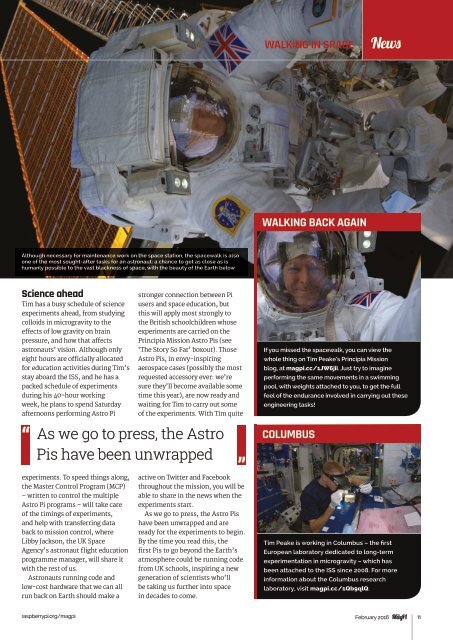You also want an ePaper? Increase the reach of your titles
YUMPU automatically turns print PDFs into web optimized ePapers that Google loves.
WALKING IN SPACE<br />
News<br />
WALKING BACK AGAIN<br />
Although necessary for maintenance work on the space station, the spacewalk is also<br />
one of the most sought-after tasks for an astronaut: a chance to get as close as is<br />
humanly possible to the vast blackness of space, with the beauty of the Earth below<br />
Science ahead<br />
Tim has a busy schedule of science<br />
experiments ahead, from studying<br />
colloids in microgravity to the<br />
effects of low gravity on brain<br />
pressure, and how that affects<br />
astronauts’ vision. Although only<br />
eight hours are officially allocated<br />
for education activities during Tim’s<br />
stay aboard the ISS, and he has a<br />
packed schedule of experiments<br />
during his 40-hour working<br />
week, he plans to spend Saturday<br />
afternoons performing Astro Pi<br />
stronger connection between Pi<br />
users and space education, but<br />
this will apply most strongly to<br />
the British schoolchildren whose<br />
experiments are carried on the<br />
Principia Mission Astro Pis (see<br />
‘The Story So Far’ boxout). Those<br />
Astro Pis, in envy-inspiring<br />
aerospace cases (possibly the most<br />
requested accessory ever: we’re<br />
sure they’ll become available some<br />
time this year), are now ready and<br />
waiting for Tim to carry out some<br />
of the experiments. With Tim quite<br />
If you missed the spacewalk, you can view the<br />
whole thing on Tim Peake’s Principia Mission<br />
blog, at magpi.cc/1JW6jii. Just try to imagine<br />
performing the same movements in a swimming<br />
pool, with weights attached to you, to get the full<br />
feel of the endurance involved in carrying out these<br />
engineering tasks!<br />
As we go to press, the Astro<br />
Pis have been unwrapped<br />
COLUMBUS<br />
experiments. To speed things along,<br />
the Master Control Program (MCP)<br />
– written to control the multiple<br />
Astro Pi programs – will take care<br />
of the timings of experiments,<br />
and help with transferring data<br />
back to mission control, where<br />
Libby Jackson, the UK Space<br />
Agency’s astronaut flight education<br />
programme manager, will share it<br />
with the rest of us.<br />
Astronauts running code and<br />
low-cost hardware that we can all<br />
run back on Earth should make a<br />
active on Twitter and Facebook<br />
throughout the mission, you will be<br />
able to share in the news when the<br />
experiments start.<br />
As we go to press, the Astro Pis<br />
have been unwrapped and are<br />
ready for the experiments to begin.<br />
By the time you read this, the<br />
first Pis to go beyond the Earth’s<br />
atmosphere could be running code<br />
from UK schools, inspiring a new<br />
generation of scientists who’ll<br />
be taking us further into space<br />
in decades to come.<br />
Tim Peake is working in Columbus – the first<br />
European laboratory dedicated to long-term<br />
experimentation in microgravity – which has<br />
been attached to the ISS since 2008. For more<br />
information about the Columbus research<br />
laboratory, visit magpi.cc/1Qb9qlQ.<br />
raspberrypi.org/magpi February 2016<br />
11


